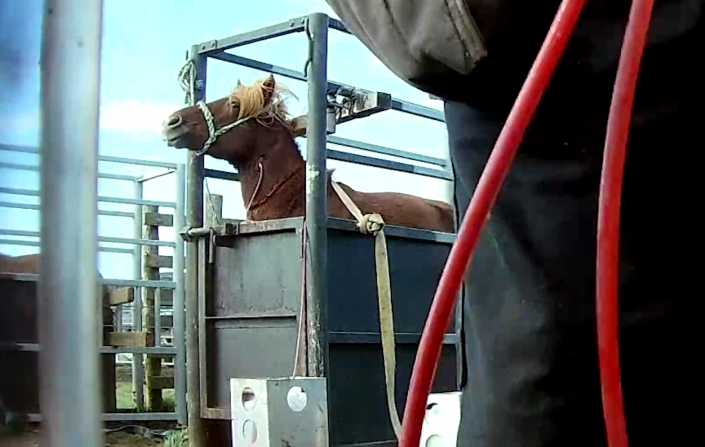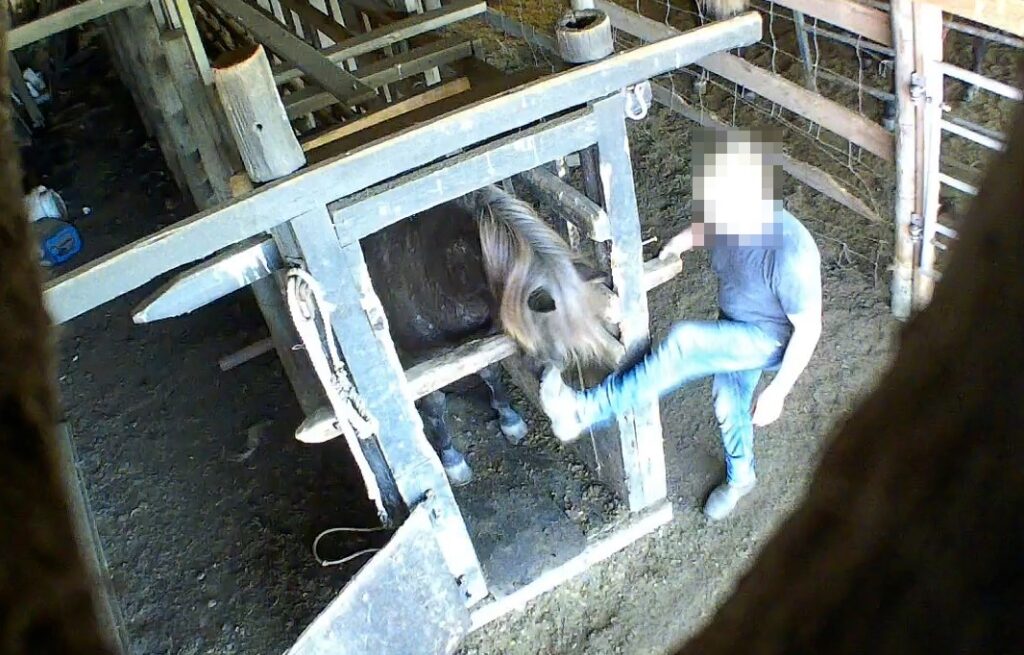PMSG, taken from the blood of pregnant mares, is one of the most expensive powders on the planet, typically costing around €1 million per 100 grams. This hormone is purchased by pharmaceutical companies across Europe to produce a variety of veterinary medicines prescribed for use on farms. They are particularly popular on pig farms where they are used to stimulate fertility in sows.
What is PMSG?
PMSG, also known as equine chorionic gonadotropin (eCG), is also used to induce ovulation in cattle, sheep, and goats. Most of the hormones distributed in Europe come from so-called “blood farms” scattered throughout Iceland.

Uruguay and Argentina were major suppliers of PMSG to European pharmaceutical companies. This began to change in 2015, when Germany’s Animal Welfare Foundation (AWF) and its Swiss partner Tierstutzbund Zurich (TSB) – two animal rights charities – conducted a series of investigations revealing the appalling conditions in blood farms. The investigation sparked intense media coverage and led to four out of five European pharmaceutical companies producing medicines containing PMSG at the time to stop supplying the hormone to South America.
However, rather than killing the industry, this move simply caused PMSG production to move to Iceland. Additional research conducted by TSB and AWF between 2019 and 2021 identified 119 blood farms in Iceland at that time.
During the summer, the blood farm’s veterinarians extract up to five liters of blood each week from pregnant mares. Animals are also severely abused. “Mares are beaten with sticks and placed in small pens, while cannulas are inserted in an unprofessional way, causing pain, stress, fear and panic,” Sonny Richichi, president of the Italian Horse Protection Association Onlus, said in an interview. said.
Because mares only produce PMSG when pregnant, breeders repeatedly perform forced abortions to collect as much of the hormone as possible. About 30% of horses on farms die, many of them from malnutrition. Of the few foals born, the males are sent to slaughter and the females, like their mothers, are used for blood extraction.
What is Europe doing?
In 2021, the European Parliament asked the Commission to ban the import of PMSG, citing the EU Directive on the protection of animals used for scientific purposes (2010/63). The guidance states that animal testing should be replaced by alternative methods whenever possible.
The European Medicines Agency (EMA) recommends the use of alternatives to animals when testing human and veterinary medicines. According to the EU’s “European Directive on the Protection of Animals Used for Scientific Purposes” (2010/63), animal testing should be replaced, wherever possible, by non-animal alternatives.

According to the German Ministry of Agriculture, there are 36 synthetic alternatives to PMSG-containing medicines on the country’s market.
Therefore, AWF claims that there is no need to extract blood from mares to produce PMSG.
In May 2023, the European Free Trade Association watchdog (EFTA) formally requested the Icelandic government to correctly apply Directive 2010/63 to the extraction of blood from mares. “Blood was collected from pregnant mares but did not ensure the effectiveness of Directive 2010/63.”
The Icelandic government acknowledged in September that collecting blood from mares violated guidelines, and in November it scrapped national regulations on blood collection that had been in place since 2022.
As a result, Directive 2010/63 will apply to blood collection from 1 November 2023.
“A country’s public admission of a breach of Directive 2010/63/EU paves the way for an EU-wide ban on PMSG production, import and use. “This is likely to set the stage for similar measures around the world.” The Icelandic Horse Federation International Federation (FEIF) said in a statement.
Next, the Icelandic government will decide whether to approve PMSG extraction practices by assessing the feasibility of using scientifically effective methods that do not involve live animals.
The government must make a decision by 2025.
Following the decision, Isteka, the company that owns Iceland’s blood farms, pledged to continue extracting blood.
The company appears to be trying to avoid loss of revenue by banning blood extraction. Isteca, recently described by the European Commission as “the European market leader in gonadotropin powders”, recorded sales of €11.4 million in 2022, the last year for which figures are available.
parma ham
PMSG is used on most intensive pig farming farms in Italy, saving farmers time and money.
This investigation, which has already led to articles in two other publications, shows that PMSG is an integral part of the Italian pork product supply chain. This includes Parma ham, a prized delicacy sold by the Parma Ham Consortium, representing about 130 certified ham producers, as a “model” product containing no preservatives or additives.
The investigation has already sparked controversy in Britain, which was a major export market for Parma ham before Brexit, with some animal welfare associations calling on supermarkets to remove products made using the hormone from their shelves.
Dr Sarah Ison, global head of research at Compassion in World, said: “All UK retailers and food companies must only source products from suppliers with higher standards of animal welfare (…) This practice is incredibly painful. “It is the cause of ,” he said. In an interview with Farming (CWF).
Sabrina Gurtner, project manager for PMSG research at TSB and AWF, said in an interview: “Supermarkets must ban the use of PMSG in their meat supply chain. Stop importing,” she said.
So where is Italy?
The Italian government did not respond to numerous questions from lawmakers and journalists about the use of PMSG.
In a bipartisan parliamentary question in April 2021 ahead of the current inquiry, MPs Michela Vittoria Brambilla (Forza Italia), Patrizia Prestipino (Pd) and Manfredi Potenti (Lega) asked whether the Ministry of Health was aware of alternative drugs available on the market. “We are still waiting for an answer,” Prestipino said in November 2023.
We asked the Ministry of Health, through the Freedom of Information Act (FOIA), to provide us with an updated list of PMSG-containing drugs approved in Italy. The Ministry of Education did not respond.
However, two official online veterinary manuals maintained respectively by the Ministry of Health and the National Association of Health Companies (AISA), an organization representing Italian pharmaceutical companies, list six medicines containing PMSG as approved for marketing. At the time of consulting in November 2023, PG600 and 2 Polygons produced by German MSD (an American Merck subsidiary) were available for purchase.
The other four drugs – Fixplan (produced by the Argentine company Syntex), Gestavet and Oviser (both produced by the Spanish company Hipra), and Fertipig (produced by the French company Ceva Santé Animale) – were not available at the time.
We also obtained a list of more than 4,000 farms in northern and central Italy that supply Italy’s Parma ham producers. Of the 100 farmers contacted, only 5% agreed to answer our questions. All reported using PG600, and one even said he had used four of the drugs listed.
A spokesperson for Prosciutto di Parma said: “The Prosciutto di Parma consortium gathers together and represents only 133 companies (…) producers of Parma ham that purchase raw materials (fresh legs) for processing purposes.” A spokesperson declined to comment on PMSG use on farms, explaining: “The consortium does not represent and does not include any farms among its members.”
The case of Parma Ham is just one example of how an entire industry relies heavily on this product.
First used in Italy in the 1960s, medicines containing PMSG are now common in the majority of Italy’s approximately 16,000 intensive pig farms (out of a total of approximately 25,000 intensive pig farms, according to Health Ministry data). The National Veterinary Association spoke to us on condition of anonymity.
This statement was confirmed by two other veterinarians we contacted.
According to TSB’s Gurtner, the use of hormones is also common practice in Germany, Spain and Poland.
The Italian ham giant’s international reputation and global reputation for quality (one-third of the 7.9 million legs produced in 2022 will be sold abroad) is linked to how animal abuse caused by the PMSG industry is linked to the food they eat. It can help raise awareness. .
“It is misleading to suggest that there is a lower-than-premium welfare behind this so-called premium product,” CWF’s Sarah Ison said of Prosciutto di Parma. She said, “If people knew what was actually happening to the animals, they would be shocked and might even boycott the product.”
Some large UK supermarkets have insisted there is no link between Parma ham and PMSG, while others have promised further investigation. “We take animal welfare very seriously,” said Marks & Spencer, a British multinational known for its high-quality food products. “(We are) investigating this matter with our supplier.”

